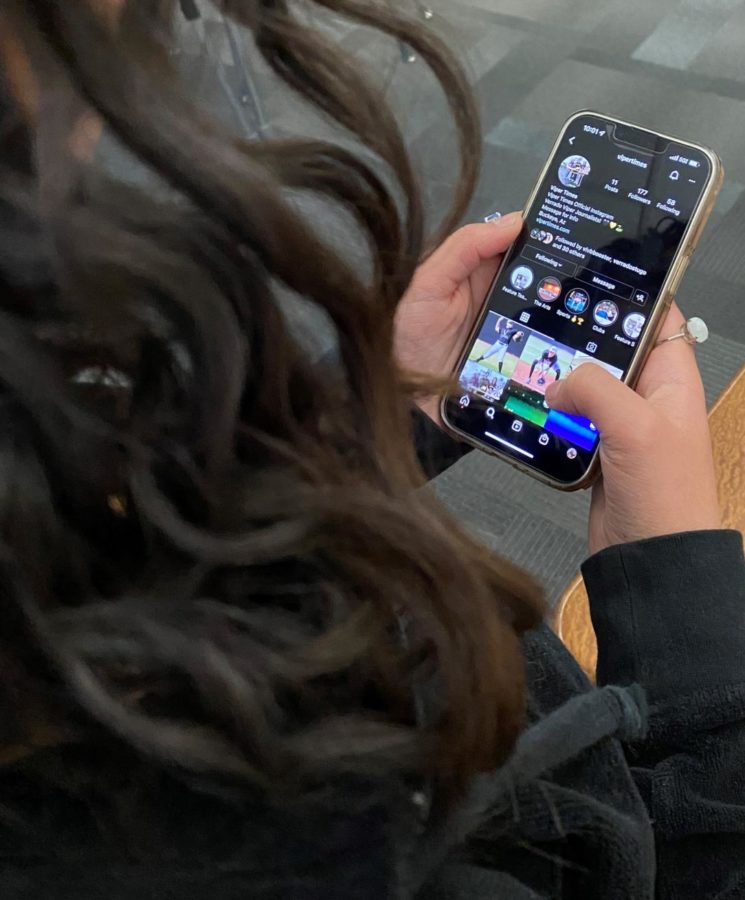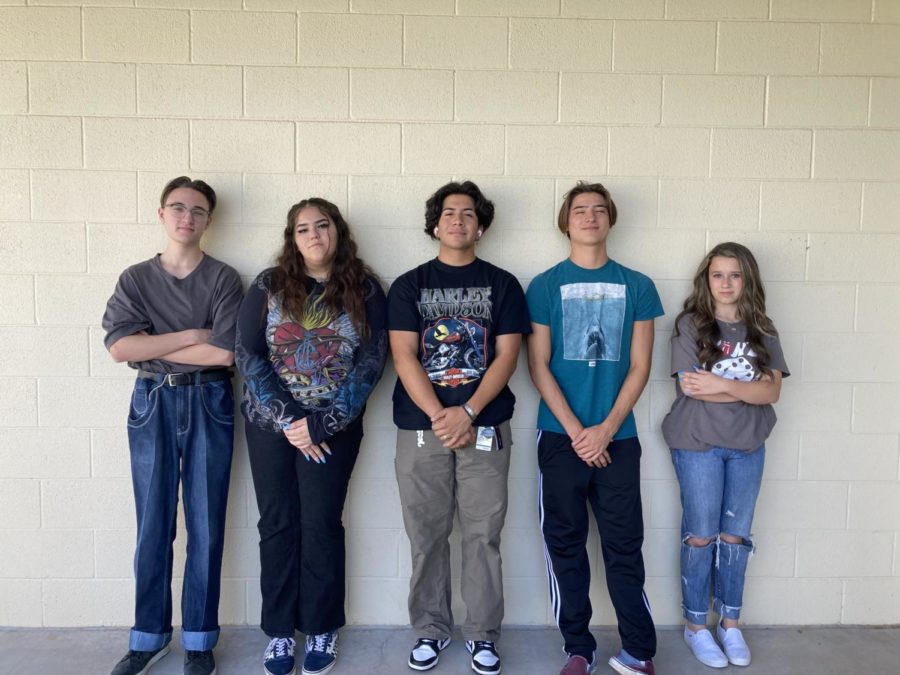Your donation will support the student journalists of Verrado High School. Your contribution will allow us to purchase equipment and cover our annual website hosting costs.
Social Media Compounds Teen Issues
November 4, 2022
What to wear? Where to be? Who to follow? Social Media is a huge part of a teenager’s life and it can be a lot of fun, but what happens when it invades every aspect of our lives?
Why Is It So Hard To Keep Up?
Siren eyes or doe eyes? Upturned eyeliner or downturned eyeliner? You’re beautiful if your smile looks like this. Stop putting your blush on your cheeks, it goes on your temples. Brown mascara looks more natural. Be the clean girl aesthetic. Be the indie sleaze. Be the rockstar girlfriend. Be the Lana Del Rey, Diet Coke, ribbons, lace, and Lolita.
If you’re on Tik Tok, you know what these words mean. If you’re on social media, you’re used to being told what to do; how to do your makeup, what clothes to wear, what to look like, what to sound like. It becomes exhausting. Every girl at one point has faced some sort of criticism regarding her appearance. And while each generation has faced its own scrutiny, being a girl and growing up in the 21st century has been exceptionally harder than ever.

Social Media has been pushing beauty standards onto young girls like its life depends on it. As you scroll through your for you page, you see a constant stream of content that feeds into insecurities. “You’re doing your makeup wrong, try this hack to look younger!” It appears that there are quite a few hacks out there to make you look younger. Slimmer. Prettier. And no matter what you try or what you do, it feels like you’re never enough.
That’s the problem, never feeling like you’re enough. It feels like once you’ve finally caught up, a new style is in. Last week the Mirror Palais fashion show debuted, and it seems like it’s already old news. Trends come and go in the blink of an eye, and if you don’t keep up, you’ll be old news, too. This year it’s Bella Hadid, last year it was Emma Chamberlain. Society disposes of people as soon as the spotlight is moved from one to another.
Obviously, a lot of problems will arise from this mentality. So when you buy House Of Sunny’s “Hockney Dress” because you saw it on Kendall Jenner and Matilda Djerf once, and then suddenly, it’s not cool anymore, you get rid of it. If it’s not donated, it’s in the landfill before it even has a chance to be worn. The rapid cycle of trending “aesthetics” that circulate Tik Tok and other social media platforms keep people wanting to be cool, but at a cost.
It is expensive to keep up with this habit, so is the dress worth it? According to Mrs.Rachel Diehl, one of Verrado’s Fashion Club advisors, “Schools can also have their own fashion trends and their own versions of more popular trends.” She states that “Many schools have fashion clubs, some even associated with FIDM (Fashion Institute for Design and Merchandising). These clubs can become local “influencers”. This can have a positive effect if these groups focus on things like upcycling and thrifting. Encouraging their schools to give up on “fast fashion” and to start creating their own looks from thrifted or donated clothes.”
Or is it just trending? Mrs. Diehl responded, “…while the proliferation of social media does bombard people with images, hacks, and tips, it also provides everyone with a platform to express their own voices, to showcase their own styles.”
In order to preserve our own mental health, we must ask ourselves questions regarding the purchases we make, or the trends we choose to follow. Verrado’s Student Support Specialist, Ms.Sabrina Booth, weighed in on social media influences: “It’s ironic that technology was essentially made to bring people closer together and it’s doing the opposite leaving some feeling lonely and isolated. Multiple studies have shown links between social media and mental health putting more people at risk for depression, anxiety, and lack of self-esteem.”
A few of these questions might look like: Do I feel confident in this? Do I feel like myself when I look like this? Is this something I see myself wearing/doing in the future? If the answer to these questions is no, then you’re likely being scammed and manipulated into liking something because it is popular, and your interest in it will slowly fade.
Ms. Booth continued to explain that “People also often struggle with the fear of missing out. Scrolling through social media people may feel like they are not good enough watching everyone else “having more fun” or “living better lives”. Even if they know these pictures are airbrushed or manipulated, it still makes us look at what we are doing with our own life.”
Breaking the bandwagon chain is hard, but it is possible, and very beneficial to the world, your pocket, and yourself.
Fighting FOMO: A Teen’s Fear of Missing Out
Gabby and friends at a football game in Amon G. Carter Stadium at TCU in Fort Worth, TX.
The moment the leaves turn from green to gold and the wind starts to blow. Fall is in the air and with it comes the first home football at Pascal High School.
Fort Worth, Texas…
The temperature is finally low enough for the big Oak trees to provide sufficient shade. The grass has started to recover and fill in after barely surviving summer, and most of all it is football season. Every year, everyone gets a new hope that Paschal will somehow be good, even though haven’t been good in many years. On the day the cheerleaders and football players dress in their uniforms, and the whole last hour is dedicated to a massive pep rally to get everyone excited. After school, the students all head to get ready with their friends. They all get decked out in their white and purple. Purple and white clothing is sold in all the stores to celebrate the opening of high school and college football. After the whole family is ready, everyone heads to Farrington Field, our home stadium. While overindulging in concessions, friends and family chant, and cheer. In the less exciting moments, all the girls go to an unpopulated area of the stands and take pictures in their cute purple and white outfits. After the game, everyone heads to Whataburger for milkshakes and to edit Instagram posts. Friends are on a high from being social and the fun of the day. They are all out having fun, while one girl sits on the couch miles away wondering what could have been if she was there.
This phenomenon that many other teens experience is called FOMO, or Fear of Missing Out. FOMO is anxiety about an exciting event happening somewhere else. This feeling often increases by looking at social media and has become a serious problem in the 21st century.
For years there have always been preconceived ideas or notions built up about high school and young adult life. If their high school experience isn’t going exactly as they thought it was supposed to go. If they are not going to parties or football games, they are missing out. When teens see social media posts about the event, there, right in front of them is a collection of all the best parts of the event. This further solidifies their feeling of missing out.
Since social media only continues to rise in popularity and the movies and shows aren’t going away, FOMO is here to stay, but there are someone ways that we as a society can deal with it and fight it. One thing to do is find a distraction. Big event coming up? Feel FOMO creeping up? Instead of pondering the thoughts of what could be, have a self-care day, or invite other friends over and create your big event. If that doesn’t work, another strategy is to remember it is all just lies. High school or young adulthood is not like the movies no matter how much people try to convince us. The social media post is just the highlight it doesn’t show all the drama or unperfect parts of the get-together. Lousie Comer, now in her 40s, said that in high school she always felt FOMO because she didn’t get invited to dances, but once she was able to get a date she realized the events “weren’t as great as I[she] thought they were.” This changed her outlook, and taught her to “have fun with the people around here.”
Learning these skills early could help anyone growing up or living in the 21st century. As social media spreads the epidemic of FOMO will also continue to spread until the day humans stop comparing each other, which will never happen, or movies stop showing idealized versions of high school we are stuck figuring out a way to fight the feeling of thinking everyone else is having fun and we are just not. Finding ways to cope with this feeling or being understanding of people who are going through these feelings will help them and our society obliterate them, and hopefully one day no child, teen, or adult has had a fear of missing out.



Abby Sikora • Dec 15, 2022 at 12:40 PM
nice article
Gabriel Morales • Dec 15, 2022 at 10:37 AM
Phones at Verrado are becoming a big problem.
Mia Chavez • Dec 15, 2022 at 10:23 AM
This is a very real issue in our generation. Thank you for sharing!
Jasmine • Dec 15, 2022 at 10:18 AM
This is so true and so good Leah!!
Michael • Dec 15, 2022 at 9:18 AM
Phones seem to be a real issue at Verrado High School ?
adisynn • Dec 15, 2022 at 8:32 AM
This article is so true! ☺️
Heavenly decker • Dec 15, 2022 at 8:31 AM
?